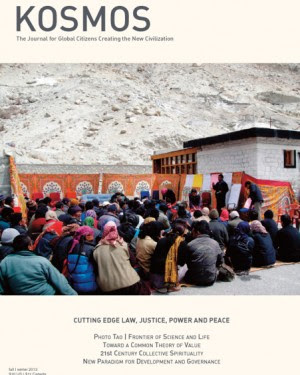Dear Readers,
Our featured author this week is Elisabet Sahtouris, an eloquent teacher of evolution biology and also a futurist. Like many of us, she senses that global transformation is underway in our hearts and minds, our communities, and slowly in our social institutions. In Ecosophy: Nature’s Guide to a Better World, in the current issue of Kosmos Journal, she suggests that greed is in decline:
“We know there is something obsolete, something hopelessly immature, about the competing and fighting and grabbing going on at the highest levels of human society. After all, those are the very things we teach our children not to do to each other. /Love and other values lost to consumerism are pouring back into our lives like fresh water. /Caring and sharing are replacing competing and grabbing, in no small measure due to the increasing empowerment of women, who have always held these values.”
But recently there has been alarm expressed in the global transformation movement that our principles of caring and sharing are being increasingly co-opted in service of exploitative business practices and that our grassroots efforts are being obscured by capitalism. Certainly we have seen this relative to “green economy”, as James Quilligan reminds us:
“There are a lot of people out there saying ‘all we need to do is put money into creating green energy and that will create jobs for people and will ultimately clean the environment and ultimately do everything we want – so what is the hang-up? /This is why sustainable development is failing – because it has been translated into market-based terms.”
In When Sharing Isn’t Caring, Nathan Schneider looks at the infusion of corporate business models into the sharing movement. Looking at examples such as Zipcar and Airbnb, he asks who is benefiting from these models.
“Sharing could lead the way to a more just and sustainable society, one in which we consume less and collaborate more. But it could also be a means for Big Business to creep even more fully into our lives, exploiting our relationships with one another and turning every attempt at generosity into an act of consumption.”
Can values really be co-opted that easily? The principles of sharing and service to humanity are ones we hold personal and dear. We have seen these kinds of concerns arise in the recent past around the wholesaling of mindfulness and meditation practices to corporate America. Not to mention the multitudes of training programs, seminars, courses, and self-help guides all promising to put us in touch with our personal power – at a price. In an article on New Monasticism, Vania Kent Harber says:
“Inner Peace is the product and people are buying. Trite slogans abound, serving the purpose of making a person feel as though they are on the path to some form of enlightenment, without asking anything of them.”
And yet, would we prefer not to see some of these practices enter the mainstream at all? Are we being commodified to the point of irrelevance? Or is it also possible that these are unavoidable ripples in the process of change? After all, no one owns the concepts of “sharing” or “interbeing” and each of us must decide for ourselves whether we are embracing these values authentically.
Living authentically is a theme of Europe in Transition: Local Communities Leading the Way to a Low Carbon Society, a comprehensive report by the European Association for Information on Local Development (AEIDL). The report examines transition as an intentional community practice.
In the spirit of true sharing, we send you greetings, blessings and gratitude.
Kosmos





